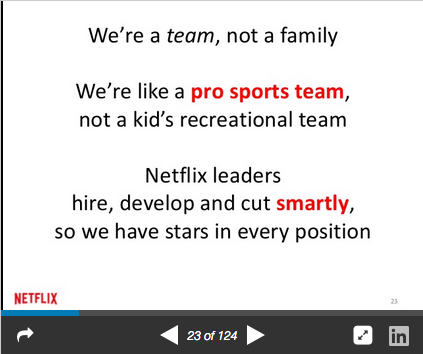It Is Not Enough to Be a Team Player; You Have to Be an Exceptional Team Player, All the Time

I’m stuck on this Planet Money episode from last week about Netflix, teambuilding, careers as journeys with many stops, and companies that only want to work with exceptional people.
The podcast episode, called Hard Work Is Irrelevant, interviews Netflix’s former chief talent officer, Patti McCord. We’ll start at the point where McCord realizes that working with extraordinarily talented people changes the workplace dynamic:
We’re in the car driving, and I’m like, why is this so fun? I can’t wait to get to work. I don’t want to go home at night. I mean, we’re working so hard. What is it about this? Reed’s like, go find out. (Laughter) Let’s find out. Let’s write it down.
She’s referring to Reed Hastings, Netflix’s CEO. Together, Hastings and McCord created the now infamous Netflix Culture Deck, which you can flip through below:
Culture from Reed Hastings
It’s 124 slides long, so I don’t blame you if you don’t make it all the way through. For Planet Money and our purposes, let’s focus on Slide 23:

I understand what McCord means when she tells Planet Money that work is more fun when everyone is interested in the team’s success and amazing at their jobs. I have had the opportunity to work on these kinds of teams (hi, Mike and Ester!) and it does make work more fun — and it makes the team part of work more fun. (I’ve also worked on teams that were about as much fun as high school group projects.)
But that does mean that people get cut. McCord calls it “moving on,” to which Planet Money’s Steve Henn asks:
HENN: How many people have you moved on?
MCCORD: Oh, hundreds.
The podcast takes a look at three different types of moving on:
1) The engineers who realized that Netflix was outgrowing them (and who, in part, realized this because Netflix was no longer giving them challenging assignments) and found their own new jobs.
2) The product tester who knew Netflix was outgrowing her job role, but still thought she wouldn’t be let go because she had put so much work in the company.
3) The marketer who worked long hours, developed a chronic back problem, and was not invited to return after her extended sick leave.
How does McCord respond to this?
We’re going to have long careers, you and me. I mean, we’re going to work at a lot of different companies. And if we can start as employees thinking of our careers as journeys and places that we go and things that we explore, then we’re going to not get all wigged-out out when things change and it doesn’t work out.
I find myself resonating with this as much as I resonated with McCord’s ideas about working with exceptional teams. It feels right, at least from my experience. Careers are like cities we visit, adapting ourselves to new cuisine and nightlife. Careers are also about change.
But that is one of those statements that works best if you are able to work as hard as an exceptional team member needs to work, all the time. Sometimes you don’t want to deal with nightlife; you just want to stay home and (you guessed it) watch Netflix.
And even if you work exceptionally hard, your boss can still tap you on the shoulder and tell you it’s time to get back on the train. As Steve Henn puts it:
But another way to read that slide is that hard work is not necessarily enough. Working hard is no guarantee you’re going to make it, and most of the employees and former employees of Netflix who I talked to, they work crazy hard.
Eventually, McCord was asked to move on from Netflix. (As with many of the other employees, she knew it was coming.) She is a consultant now, which is a different type of team player. As a freelancer, you have to constantly remake your team and cut the worst players in favor of new stars. You have to think months in advance, asking yourself “who do I want on my team next year?” You can also be cut, as your star clients reconfigure their teams. And you still have to work very, very hard.
And that poses a big problem. It makes work a bit like money: the talented one percenters who can keep up this pace are in one corner claiming all the good jobs and resources, and the rest of us are struggling to get by. It’s much more fun to follow the journey of your career if you are able to ride a first-class train the whole way, after all. It’s less fun to have to stand on the corner and wait for a bus.
So I’m stuck on this Planet Money episode because it feels both right and wrong. Of course I want to get up every morning and work with fun, talented people who are devoted to the team’s success. It makes work feel like flying. (Not commercial air travel flying. Dream flying.)
But that does not necessarily mean that these people need to be devoted to the team’s success all the time. And it doesn’t necessarily mean that you have to cut these team members as soon as you feel like you’ve outgrown them, although as a freelancer, I understand that too. I’ve stopped working for clients I’ve outgrown.
I’ll tell you that when I first read through that Netflix Culture Deck a few years ago, I thought “I do not want to work at Netflix.” Which I don’t have to worry about, really, because they’d never have me.
What do you think? Do you have the same sort of “these are great ideas but…” response to McCord’s interview?
Support The Billfold
The Billfold continues to exist thanks to support from our readers. Help us continue to do our work by making a monthly pledge on Patreon or a one-time-only contribution through PayPal.
Comments